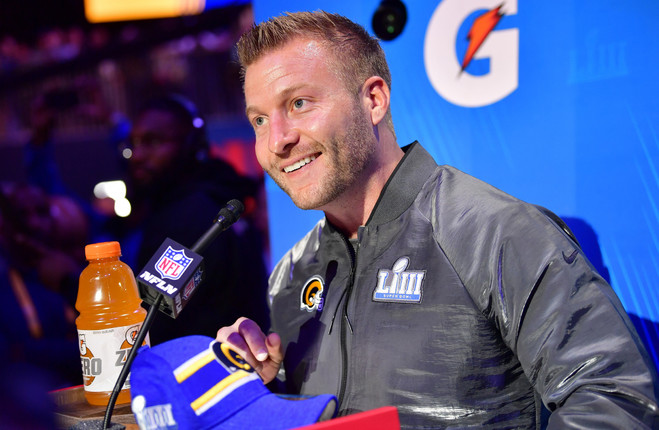IN CASE YOU haven’t heard, Sean McVay is young.
In fact, he is so young that he is a full eight years younger than Patriots quarterback Tom Brady and half the age of New England head coach Bill Belichick (66).
He is also the most in-demand coach in football, so much so that anyone who has ever shared a beer with him is likely to be offered an NFL head coaching job in the next couple of seasons.
But what makes McVay so good at such a young age?
1. Growing up Gruden
He may be just 33 years old, but McVay has been around football a long time. His grandfather, John, held various positions with the San Francisco 49ers and was part of the front office that oversaw the development of five Super Bowl winning squads.
After a good high school and unremarkable collegiate playing career, McVay took up a position with the Tampa Bay Buccaneers under head coach Jon Gruden when he was just 22 before joining Gruden’s brother, Jay, as tight ends coach of the United Football League’s Florida Tuskers a year later.
And while Jon Gruden might be a punchline for NFL fans, McVay says the Raiders coach is an inspiration for his coaching style, adding: “So much of what I’ve learned about this game has been from the mentorship that he’s provided.”
2. A slice of luck
As important as it is to be good, it’s equally key to have a slice of good luck.
In 2010, McVay returned to the NFL when he was named assistant tight ends coach in Washington under head coach Mike Shanahan. He was promoted to tight ends coach the following season at the request of offensive coordinator Kyle Shanahan.
However, while a lot of the offensive coaching staff found themselves surplus to requirements after the Robert Griffin III debacle in Washington, McVay happened to be lucky enough to know the incoming head coach quite well and was not only kept on staff, but promoted to offensive coordinator by Jay Gruden.
3. A family affair
McVay obviously has his own ideas about how an offence should run, but his three years as Washington offensive coordinator showed just how much he’d picked up from Kyle Shanahan in particular.
A few obvious similarities — such as the use of play-action and pre-snap motions — form part of both the McVay and Shanahan offence. But there’s an overarching shared philosophy too; by presenting the same look on almost every down you give the defence no clue as to what you might do next.
While the 49ers prefer to have two running backs, a tight end and two wide receivers, the Rams run with an ’11′ personnel, which features one running back, one tight end and three receivers so, while McVay has clearly learned from Shanahan, they do have their differences.
4. Painting by numbers
His form has been poor down the stretch, but Todd Gurley is arguably the best running back in the NFL. Despite this, just two players, Tarik Cohen and Wendell Smallwood, have faced fewer eight-man boxes — where the defence stacks the middle of the field with eight or more defenders to stop the run — than Gurley.
Is this because NFL defensive coordinators are bad and don’t know how to stop the run? No, it means that McVay only calls a run play when the numbers are in his favour. Take this play call against the Chargers back in week three when McVay saw his side faced just five defenders in the box.
11-yard run by #Rams RB Todd Gurley vs 5-man box. pic.twitter.com/C6dbNQIQr7
— Marcus Mosher (@Marcus_Mosher) September 25, 2018
Because the Rams have three receivers on the field, the Chargers are already in their nickel package to defend the pass. By adding a fake jet sweep, McVay actually reduces the number of defenders playing the run to four, who must try to beat five offensive linemen and Gurley.
Were it not for a good tackle by strong safety Derwin James, it’s likely the Rams would have scored a touchdown on the play and there are countless examples of McVay taking advantage of situations like this in his time calling plays.
5. Keep it simple, stupid
We’ve briefly touched on McVay’s habit of keeping defences guessing by running most of their offensive plays with the same ‘11’ personnel look. In fact, at one stage this season they were running 95% of their plays with that personnel. While that fell to 77% by the end of the year, it’s still well in excess of the league average of 54%.
This not only gives his run game a massive advantage — running backs with at least 20 carries averaged 4.75 yards per carry against just six men in the box from 2016 to 2018, compared to 3.59 yards against eight — but it opens up the passing game too.
Quarterback Jared Goff’s passer rating on any given snap was 95 during the regular season, but jumped all the way up to 112.3 when the Rams used play-action. And that’s the real beauty of the McVay offence. Teams are damned if they defend the run and damned if they don’t.
This weekend, McVay gets to test himself against the greatest coach in the history of football for the sport’s biggest prize.
And while McVay and the Rams may not win on Sunday, the fact that he could lose the next three Super Bowls and still be the youngest head coach to lift the Vince Lombardi trophy tells you he has all the time in the world to become even better.
Subscribe to our new podcast, The42 Rugby Weekly, here:

